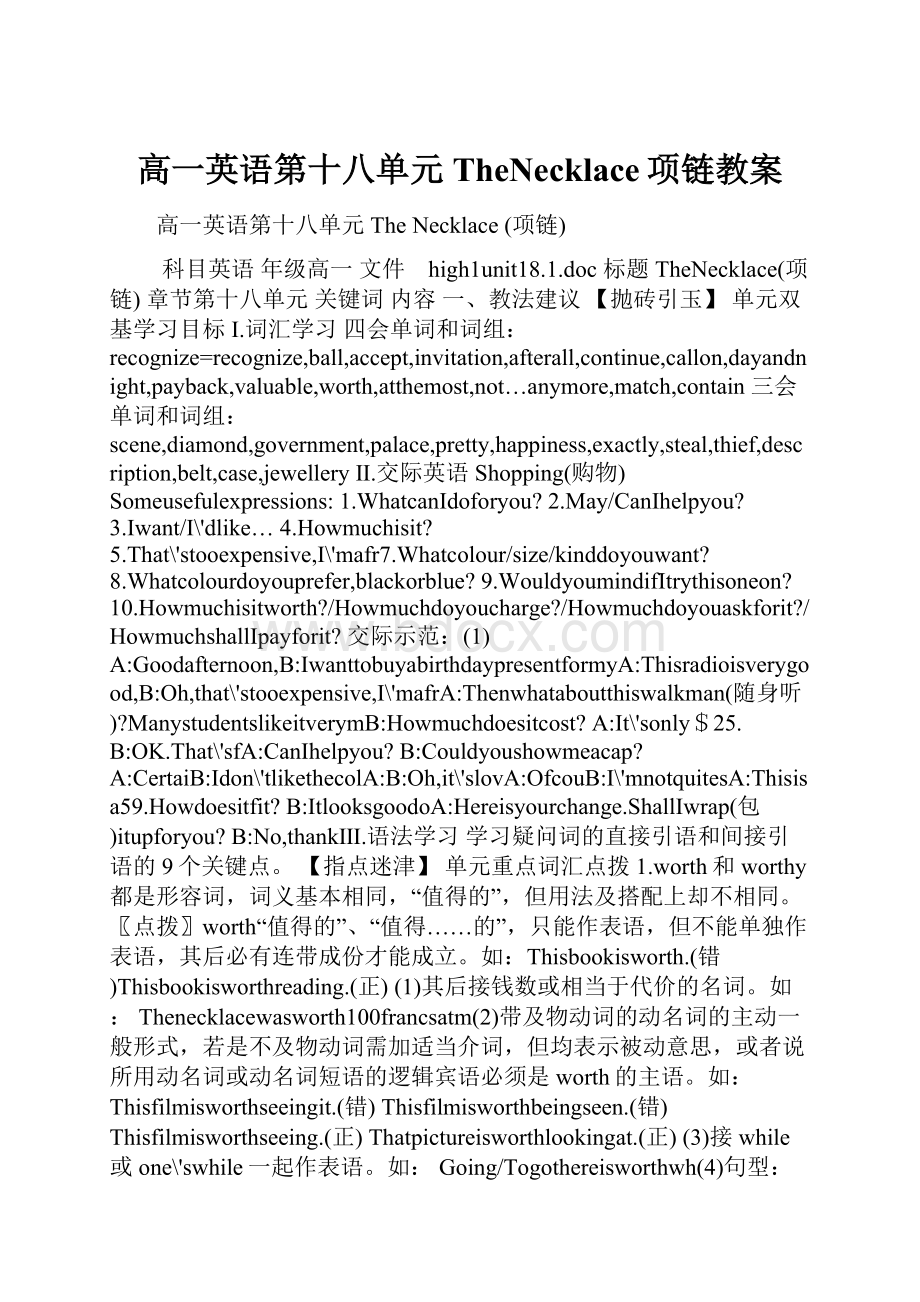高一英语第十八单元TheNecklace项链教案.docx
《高一英语第十八单元TheNecklace项链教案.docx》由会员分享,可在线阅读,更多相关《高一英语第十八单元TheNecklace项链教案.docx(6页珍藏版)》请在冰豆网上搜索。

高一英语第十八单元TheNecklace项链教案
高一英语第十八单元TheNecklace(项链)
科目英语年级高一文件 high1unit18.1.doc标题TheNecklace(项链)章节第十八单元关键词内容一、教法建议【抛砖引玉】单元双基学习目标Ⅰ.词汇学习四会单词和词组:
recognize=recognize,ball,accept,invitation,afterall,continue,callon,dayandnight,payback,valuable,worth,atthemost,not…anymore,match,contain三会单词和词组:
scene,diamond,government,palace,pretty,happiness,exactly,steal,thief,description,belt,case,jewelleryⅡ.交际英语Shopping(购物)Someusefulexpressions:
1.WhatcanIdoforyou?
2.May/CanIhelpyou?
3.Iwant/I\'dlike…4.Howmuchisit?
5.That\'stooexpensive,I\'mafr7.Whatcolour/size/kinddoyouwant?
8.Whatcolourdoyouprefer,blackorblue?
9.WouldyoumindifItrythisoneon?
10.Howmuchisitworth?
/Howmuchdoyoucharge?
/Howmuchdoyouaskforit?
/HowmuchshallIpayforit?
交际示范:
(1)A:
Goodafternoon,B:
IwanttobuyabirthdaypresentformyA:
Thisradioisverygood,B:
Oh,that\'stooexpensive,I\'mafrA:
Thenwhataboutthiswalkman(随身听)?
ManystudentslikeitverymB:
Howmuchdoesitcost?
A:
It\'sonly$25.B:
OK.That\'sfA:
CanIhelpyou?
B:
Couldyoushowmeacap?
A:
CertaiB:
Idon\'tlikethecolA:
B:
Oh,it\'slovA:
OfcouB:
I\'mnotquitesA:
Thisisa59.Howdoesitfit?
B:
ItlooksgoodoA:
Hereisyourchange.ShallIwrap(包)itupforyou?
B:
No,thankⅢ.语法学习学习疑问词的直接引语和间接引语的9个关键点。
【指点迷津】单元重点词汇点拨1.worth和worthy都是形容词,词义基本相同,“值得的”,但用法及搭配上却不相同。
〖点拨〗worth“值得的”、“值得……的”,只能作表语,但不能单独作表语,其后必有连带成份才能成立。
如:
Thisbookisworth.(错)Thisbookisworthreading.(正)
(1)其后接钱数或相当于代价的名词。
如:
Thenecklacewasworth100francsatm
(2)带及物动词的动名词的主动一般形式,若是不及物动词需加适当介词,但均表示被动意思,或者说所用动名词或动名词短语的逻辑宾语必须是worth的主语。
如:
Thisfilmisworthseeingit.(错)Thisfilmisworthbeingseen.(错)Thisfilmisworthseeing.(正)Thatpictureisworthlookingat.(正)(3)接while或one\'swhile一起作表语。
如:
Going/Togothereisworthwh(4)句型:
Itisworthwhiledoing/todo.sth.此句型中,it为形式主语代替动名词或不定式短语doing/todosth.与
(2)中的动名词不同,此时的动名词或不定式必须是完整的非谓语动词短语作主语。
如:
Itisworthwhilediscussing/todiscussthequest〖点拨〗worthy“值得的……”,“高尚的”,“可尊敬的”、“相配的”等,可作表语也可作定语,作表语时其后也必须有连带成份。
(1)加介词of短语。
of后可接名词(一般不接表示钱的名词)、代词和动名词的被动式。
如:
ThewatchwasworthyofthechThismuseumisworthyofavi
(2)接不定式的被动式。
Thisquestionisworthytobediscus(3)放名词前作定语,worth不能。
如:
Bethuneisaworthy〖点拨〗注意,汉语中说“很值得时”只能用wellworth/worthy不能用其他副词。
如:
Thisreportiswellworthlistenin2.steal(stole,stolen)偷Whenathiefwasstealingcorn,apasser-bycaughthimbytheh〖点拨〗stealsthfrom+sb(或者地点)是“从……偷”。
但是,robsbofsth抢劫某人。
3.description描述Pleasegivemeabrief/fulldescriptionoftheaccid[1][2][3][4]下一页
〖点拨〗beyonddescription无法形容,难以描述。
如:
Theladywasbeautifulbeyonddescript4.jewellery=jewelery(总称)珠宝Shehasalotofjewell〖点拨〗jewellery是不可数名词,可以借助piece来表达可数的概念。
如:
Someofmyjewelryismiss单元词组思维运用1.afterall毕竟,到底;别忘了(该词组用语提醒对方或者表示转折)Don’tbesohardonIthoughthewouldbeagainstmyplan,buthedidhisbesttocarryitoutafter2.alltheseyears这么多年3.thisonce就这么一回;仅此一次4.callonsb拜访某人。
callat+地点是“去某地看看”。
如:
SoIcalledonyouandaskedifIcouldborrowsomejewell另外,callonsbtodo是“号召某人干……”。
5.bringout取出I’dlikeyoutobringthem6.tryon试穿。
但tryout检验。
Neverbuyshoeswithouttryingthemonfi7.haveaverygoodtime过得十分愉快8.withoutluck真倒霉9.beexactlylike丝毫不差地像10.dayandnight=nightandday夜以继日地11.payback偿还;还钱Ifyoulentmoneyfromhim,don’tforgettopaythembacktohimrecen12.atmost=atthemost至多;充其量Thejobwillbefinishedintendaysatthem注意其反义词组是:
atleast=attheleast13.matchAand/withB“把A和B配合”Doesthistiematchwithmysuit?
14.invitesbto+地点“邀请某人去……”15.theLostandFound失物招领处16.describesthtosb向某人讲讲……17.theentranceto/of…通向……的入口18.liveahardlife过着艰难的日子19.setone’smindto/onsth=setone’sheartto/onsth一心扑在……Nothingintheworldisdifficultifyousetyourmindt20.lookbackover/on回顾;回想过去。
lookforwardto+名词或者动名词“渴望……”。
21.fromhousetohouse挨家挨户HewentfromhousetohousetopayNewYearca22.drinkto为……干杯;为……祝福Theydrinktoeachother’shealthandwisheachothergoodl注意:
“为……的健康干杯”也可以用drinksb’shealth二、学海导航【学法指要】单元难点疑点思路明晰1.Iwastheonlypersoninmyofficewhowasinvited.我是我的办公室里唯一的一个受邀请的人。
〖明晰〗当先行词前有theonly,thevery,all,every,any,on等修饰时,引导定语从句的关系代词只能用that(这是相对which而言的),它在从句中作主语或宾语。
但是,如果先行词指的是“人”,通常要用who。
例如:
TomistheverymanwhoI\'mgoingtoemp2.Youtrieditonanditlookedwonderfulonyou.你戴上项链试了试,它戴在你身上好看极了。
〖明晰〗
(1)tryon意为“试穿(衣服、鞋等);试戴(帽子、手套、首饰等)”,on为副词,若代词作其宾语,需置于try和on之间,如本句中的triediton。
例如:
Pleasetryonthispairofnewshoesandseewhethertheyfityouor
(2)该句中的两个on都有“穿、戴”之意,但是,第一个on是副词,第二个on是介词,其后要跟宾语。
又如:
ThefoolishKinghadnothingonthat3.Itcostusthirty-sixthousandfrancs.它(那条项链)花了我们三万六千法郎。
〖明晰〗cost意为“花费”,指花费金额、费用、时间、劳力等,不可用于被动语态,其主语是表示物或事的词。
又如:
Suchadifficultjobcostsalotoftimeandeff当cost表示“价值多少钱”时,可与beworth换用。
例如:
Thispencosts(=isworth)20y另外,下面几个表达“某人花多少钱做某事”的句型很重要,也是常考点,需注意。
(1)主语(物)+costssb.+钱+todo
(2)主语(人)+pay+钱+for(3)主语(人)+spend+钱+on(4)Ittakessb.+钱+todosth.=Ittakes+钱+fo(5)主语(人)+buysth.for+钱。
Itwillcostyou$500torepairtheEverymonthshespendsone-thirdofhersalaryonboIttookhimalotofmoneytobuyheranewcHeboughtthebagfor$20.4.recognize与know〖明晰〗
(1)recognize“认出,辨认出;承认,认可;认识到”,建立在原来认识的基础上。
如:
ShehadchangedsomuchthatIcouldhardlyrecognize
(2)know也有“认出,认识”之意,常和from连用,其含义为“辨认,区别”。
They\'retwinsandit\'salmostimpossibletoknowonefromtheot注意:
recogni
[3][4]下一页
ze为短暂性动词,不能与延续的时间状语连用;如需表示长时期相识时,可用动词know取代recogn5.accept,receive与get〖明晰〗
(1)accept“接受,答应”,主要表示主观上的同意接受,着重主语的态度。
Hehasacceptedthedoctor\'sadvicetogiveupsmok
(2)receive,get都可表示“收到”,强调客观,并不涉及主观上是否愿意接受。
如:
Maryreceived/gotagiftfromafriendofhers,butshedidn\'tseemtoaccep6.“拜访”:
callat,callon,dropin(on/at),visit,payavisit(to)〖明晰〗
(1)callat后接地点,表示到某处去拜访某人。
如:
SheaskedhimtocallatBrown\'sHoteltoseeherdaugh
(2)callon比较正式,后接人作宾语,指进行短暂的社交或公务关系的访问,有时也有callupon。
如:
Afterwemovedintothenewhome,ourneighbourscametocallo(3)dropin则一般表示非正式的走访,顺便拜访,事先不打招呼。
如果后跟人,介词用on;如果后跟地点,介词用at。
如:
HedroppedinonuslastSunNowandthentheywoulddropinatthehousesandchatwiththework(4)visit正式用语,可以表示进行时间较长的访问。
既可指进行友好或社交性的访问,也可指因职务关系而进行的访问。
如:
Whendoesshevisityouagain?
Thedoctorregularlyvisitedherintheaftern(5)payavisit(to)“对……进行访问;去看望……”,此处visit是名词,该词组与visit同义。
如:
Perhapswe\'llpayavisittoChinafromMarch16to23.7.payback,payfor,payoff,payout〖明晰〗
(1)payback“偿还,偿付;报复”。
pay本身即有“付清、付帐”的意思,加back后更强调“偿还”的意思。
如:
It\'shightimehepaidyoubackthemoneyheowes
(2)payfor“付款,偿付”。
如:
Howmuchdidyoupayfortherecorder?
(3)payoff“还清债务,付掉”。
如:
I\'llpayoffmydebtwiththisch(4)payout“付出”。
如:
Theypaidout$550thatmo8.SEEC高一册第18单元第69课有这样一个句子:
I\'msorry,butIdon\'tthinkIknow该句的汉语译文是:
对不起,我觉得我不认识你。
不能译成:
对不起,我不认为我认识你。
从译文可以看出,该句否定词not否定的不是think而是know,这就是我们常说的否定转移。
〖明晰〗※从主句转移至从句。
(1)从主句转移至that(that可以省略)引起的宾语从句。
如:
Idon\'tthinkthathe\'llacceptyourinvitation.我认为他不会接受你的邀请。
Idon\'tbelievehetoldalie.我相信他没有说谎。
(2)从主句转移至because引起的原因状语从句。
如:
Hedidn\'tgotoseethemoviebecausehelikedit.他不是因为喜欢那部影片才去看它的。
(3)从主句转移至as引起的方式状语从句。
如:
Shedidn\'tdoherjobasIhadtold※以谓语为枢纽,在句子成分之间相互转移。
从其它成分转移至谓语。
(1)从主语转移至谓语。
如:
Nothinghashappe
(2)从宾语转移至谓语。
如:
Iknownoneoft※从谓语转移至其它成分。
(1)部分否定时,从谓语转移至主语。
如:
Allthenecklaceswerenotmadeofdiamond.并非所有的项链都由钻石制成。
(2)从谓语转移至状语。
如:
Don\'tgotheresoea(3)从复合谓语的前半部分转移至后半部分。
如:
Thenewsdoesn\'tseemtobet9.L.69(P.13)中有:
Shemarriedamanwithalotofmoney.(她嫁给了一位富翁。
)句中的marry一词,意为“与(某人)结婚;娶;嫁”。
但它的用法及搭配远不止这些。
〖明晰〗※marryvt.“与(某人)结婚”;“娶(某人)为妻”;“嫁给(某人)”。
用于指配偶的情况,需要接宾语。
如:
HeisgoingtomarryMissAl※marryvi.“结婚”,只表示婚姻状况,常有副词修饰。
如:
Thedoctormarriedlateinlife.这医生结婚很晚。
Thefamousactressnevermarr※be(get)marriedtosb.“与……结婚”。
表示已婚状态。
如:
Shewasmarriedtoaforeig※bemarried表示已婚状态,常与一段时间状语连用。
如:
WillandPaulahavebeenmarriedforthreeye※marryvt.“把某人嫁给……”或“给某人娶……”。
如:
Shehasmarriedallherdaughters.她已把她的女儿都嫁出去了。
Herparentswanttomarryhertoarichbusinessman.她的父母要把她嫁给一个富商。
※marryvt.(指牧师、官员等)“为……主婚。
如:
Whichpriestisgoingtomarrythecoupleofyou?
哪位牧师为你们俩主婚?
Anoldfriendmarriedthem.一位老朋友为他们证婚。
注意:
1)marry作“嫁;娶”解时,为终止性动词,不可与表示一般时间的状语连用;若表示结婚有一段时间时,应用begetmarried.如:
Whendidshemarry?
应改为:
Whendidshegetmarried?
2)问现在的婚姻状态时,可说:
Isshemarried(asingle)?
不可说:
Hasshemarried?
/Doyoumarry?
/Haveyoumarried?
应改为:
Areyoumarried?
/Haveyougotmarried?
3)表示一个人何时结婚时应用:
—Whenweretheymarried?
—Hewasmarriedin1980.—Whendidyougetmarried?
—Igotmarriedin1983.4)表示“和某人结婚”,不可受汉语影响用with,而用to;也可
[3][4]下一页
什么介词都不用,但应注意句型搭配。
如:
①Shemarriedwithadoc②Shewasmarriedwithadoc【妙文赏析】GuyDeMaupassant(莫泊桑)MaupassantwasborninFrancein18050.Hisparentsseparatedwhenhewasaboutsix,andhewenttolivewithhismother.Attheageofthirteen,hewassenttoschool,butwasforced(被迫)toleavethere.Hewenttoanotherschoolandtherehewaspraisedforanexcellentpoem(诗)hewrote.Inthiswayhebeganhiswritingatanearlyage.DuringtheFranco-PrussianWar(普法战争),hehadtogiveupwriting.Afterthewar,hewenttoParistolookforajobwhichhehopedthatwouldleavehimfreetimetowrite.ItwasinParisthathemetoneofthegreatestwriters,formwhomhelearnedagreatdThoughhefoundmaterial(素材)formanystorieswhileworkingasaclerk(职员),hefoundlifeintheofficerestricted(受限制的).Afteroneofhisstorieswaspublished,helefthisofficeinordertospendfulltimewriting.Bytheageofthirty-four,hebecamequitefamous.Duringthistime,hewrotesomeofhisbest-knownworks,includingTheDiamondNecklace,oneofthemostFamousshortstoriesinthewoA.MaupassantlivedahappylifeinhischildhoodB.Maupassant\'searlylifewasnotahappyoneC.MaupassantfinishedmiddleschoolattheageofthirteenD.Maupassantbeguntowritepoemsbeforehewasthirteen2.DuringthewasMaupassant_C.hadtostophiswriti3.WhydidMaupassantleavetheoffice?
A.BecausetheofficeworkwastoohB.BecausehewantedtospendhisfulltimeonwritD.Becausehedidn\'tlikeworkinginoffiA.whenhewasyou5.Whichofthefollowingistrue?
A.Itwasnotuntil43thathebecamefamB.Althoughoneofhisstorieswaspublished,hewouldn\'tgiveuphisjobasaclC.Maupassantwasfamousallovertheworldasashortstorywri[3][4]